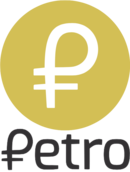Crypto Academy Week 14 - Homework Post for [@levycore].Learn about cryptocurrency
Hello again Professor @levycore. The world of cryptocurrencies is fascinating. When I started studying the projects and all the developments I was really hooked. Knowing that everything we have today is a result of decentralization development opened my eyes even more..
 Image edited by me in Powerpoint.
Image edited by me in Powerpoint. 
Venezuelan government token Logo, Image taken from Source.
Through this cryptocurrency Venezuela is trying to fight inflation, making periodic payments with this cryptocurrency to public workers. The problem is that the vast majority of people do not know how to redeem these tokens, and it is not accepted in the vast majority of commercial establishments.
On the other hand, many doubt that it is really a decentralized currency since this crypto asset is totally controlled by the government of Venezuela and the government of Russia. Here we can see its whitepaper. SourceIn fact, it does not even appear in the Coinmarket cap.
On the other hand, after the pandemic and because of the loss of jobs, more and more people have started to get involved with cryptocurrencies. For example, every day more and more academies proliferate that help people invest in cryptocurrencies and develop portfolios. Some are legitimate and many others are fraudulent.
During the last decade, Bitcoin had preeminence in Venezuela, however, since the pandemic within our communities there has been an exponential growth of the Steemit Platform. Every day more and more people are benefiting from Steemit cryptocurrencies. The development and results can be seen in the posts of our communities #steemvenezuela or #starsofsteem.
By the year 2021, with the rise of the SBD people who had years without enjoying a good meal, or buying a household appliance finally have the joy of seeing their luck change... thanks to cryptocurrencies.
The next step in our country is happening this very month, as within our communities we are starting to encourage the payment of services and products through SBD and STEEM.
In one of our Discord chats, our Steem representatives have created a group called "Market Place Stars of Steem", which is a group totally destined to offer services with cryptocurrency payments. This makes us totally independent from the traditional financial system.

Development of cryptocurrencies in my community. Marketplace for trading services and products with SBD and STEEM.. Image taken from my phone
In fact, many of our members do not have a bank account because they do not meet the minimum requirements demanded by banks, such as having a permanent job or bank references. Thanks to cryptocurrencies this is no longer a problem, as we can all start to manage our finances in a decentralized way.
In addition, several platforms have been developed that allow the exchange of cryptocurrencies to fiat currency, which have accelerated the development of cryptocurrencies in Venezuela. The most important of these is "Orinoco". Source
 Orinoco platform Source.
Orinoco platform Source.
Let's get started.
 Image edited by me in Powerpoint.
Image edited by me in Powerpoint. 1. What is the fundamental difference between Cryptocurrency and the conventional financial system?
2. Why is a decentralized system needed?
3. What affects the value of cryptocurrencies?
4. Why can't everyone be a miner?
In the case of the second best-known protocol, Proof of stake, with which ETH is mined, the economic factor again plays a key role.
Since this mining protocol is based on the cryptocurrency investment that the person has. In this way, those who have the greatest possibility of generating new blocks are people with greater economic resources. In general, mining has become an activity with a lot of competition, so it is not as profitable today as it was a few years ago.5. Why can cryptocurrency transactions be called more transparent?
6. Explain how the development of cryptocurrency in your country?


 Orinoco platform Source.
Orinoco platform Source.
Hi @allbert, Thanks for submitting your homework
Feedback: You have completed every point and you have understood the basics of cryptocurrency
Rating: 9
Thank Professor!!!!